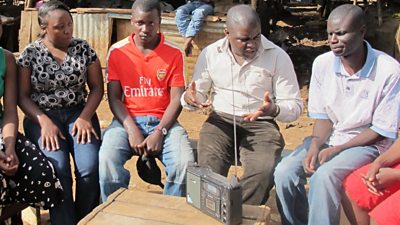We have discovered that there are many quacks, who have set up dispensaries and medical clinics in the informal settlements with the main aim of making a profit.
Broadcast throughout East Africa, it started out by tackling sexual and reproductive health issues. Later, it focused on health systems in the region.
One radio report for the show, produced as a result of ±«Óătv Media Action training, revealed that most of the health facilities in informal settlements around Nairobi failed to meet the government’s regulatory standards.
From research to reporting
The Africa Population and Health Research Centre (APHRC), an organisation that had benefited from ±«Óătv Media Action’s workshops on basic media skills for researchers, carried out a study which uncovered the issue.
The research found that many staff in private facilities had received no training in basic health practices. Only 27% of personnel had been trained in infection control, compared to 82% of those working in public hospitals.
Kimasomaso reporters investigated the findings – sometimes posing undercover as patients – and recorded the experiences of members of the public for a special programme which brought together Nairobi’s health stakeholders.
The show reported how residents of slums in the city have few reliable healthcare options for the treatment childhood illnesses, maternal health and family planning services - among others.
The assessment was based on an analysis of health facilities in Kibera, Korogocho and Viwandani slums of Nairobi.
Airing the issues
Speaking on the show, the executive director at the Medical Practitioners and Dentist Board, Daniel Yumbya, said he planned to close down clinics and "haul them to the court of law".
"We have discovered that there are many quacks, former nurses and hospital workers, who have set up dispensaries and medical clinics in the informal settlements with the main aim of making a profit. Some of these clinics lack the necessary facilities for dispensing medical and health services," he said.
The special programme was part of a series that investigated healthcare institutions, reviewed research evidence and engaged with policy makers in Kenya, Uganda and Tanzania. It asked what the Kenyan government could do to ensure access to quality healthcare, particularly with the rapidly increasing population of slums.
Kimasomaso reporters interviewed health officials including the permanent secretary of the Kenyan Ministry of Health and the Tanzanian Minister of Health. The willingness of government officials to participate in panel discussions proved invaluable.
Project information
| Project name | Kimasomaso (Speak Out Boldly) |
| Funder |
JICA - SAFARICOM, Ford Foundation |
| Dates | 2004-2011 |
| Themes | Governance |
| Outputs | Kimasomaso |
